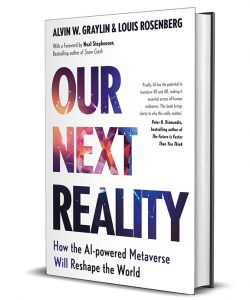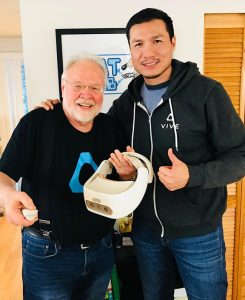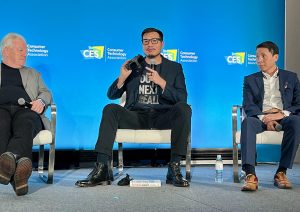By Wayne Gillam | UW ECE News

UW ECE alumnus Alvin Graylin (BSEE ‘93) is co-author of a new, visionary book that seeks to answer some of the most pressing questions about how the confluence of artificial intelligence and immersive technologies stands to reshape our world in profound ways. He also is scheduled to be the honored guest speaker at this year’s UW ECE Graduation ceremony.
UW ECE alumnus Alvin Graylin (BSEE ‘93) is looking ahead. And what he sees coming in technology development over the next decade has given him reasons for both hope and concern, especially when it comes to artificial intelligence and extended reality, or XR, which encompasses virtual reality, augmented reality, and mixed reality environments.
“We’re in a tenuous time in this society, where AI and XR is growing so quickly that it will be very difficult for society to cope, from cultural, economic and geopolitical perspectives,” Graylin said. “The decisions that we make as a species in the next five to 10 years about how we handle this technology will impact the next thousand years in terms of how humanity will progress.”
That last statement may sound hard to believe, but Graylin is an influential technology pioneer, executive, entrepreneur, and thought leader who got his start in the semiconductor industry and has well over 30 years’ experience creating, developing, and delivering products based on AI and XR. His career is international in scope, spanning the U.S., China, and Taiwan, and it includes leadership roles at companies in all three countries.
Currently, Graylin is the Global VP of Development for HTC, a Taiwanese consumer electronics company that is a world leader in the development of virtual reality and augmented reality platforms. Part of his job at HTC entails serving as co-head of the ViveX VR Accelerator, which is the company’s global program for investing in startups at the intersection of virtual reality, augmented reality, AI and 5G technologies. He is also vice-chairman of the Industry of Virtual Reality Alliance in China and president of the Virtual Reality Venture Capital Alliance, which brings XR investment opportunities to its member corporations and venture capitalists.
“We’re in a tenuous time in this society, where AI and XR is growing so quickly that it will be very difficult for society to cope, from cultural, economic and geopolitical perspectives.” — UW ECE alumnus Alvin Graylin
Graylin’s entrepreneurial and leadership experience is extensive. He has founded four venture-backed startups in areas ranging from AI-based natural language search to big-data AI analytics across China and the U.S. As an investor, he has been involved in funding over 100 startups. He is a much sought-after speaker, who is frequently featured at leading international conferences and in the media on topics relating to AI, XR, entrepreneurship, and for his insights on the Chinese market. He also is scheduled to be the honored guest speaker at this year’s UW ECE Graduation ceremony.
Now, Graylin is co-author of a new, visionary book that seeks to answer some of the most pressing questions about how the confluence of AI and XR technologies stands to reshape our world in profound ways.
Our Next Reality

Graylin’s book, “Our Next Reality: How the AI-powered Metaverse will Reshape the World,” will be released through Amazon Kindle on March 5, Audible on March 6, and it will be available in print June 4 this year.
“Our Next Reality: How the AI-powered Metaverse will Reshape the World” explores 13 questions about AI and the metaverse (today’s internet built out as an XR environment), which Graylin debates with his co-author Louis Rosenberg, who was an early pioneer of virtual and augmented reality development and is a longtime AI researcher. It also includes a foreword by renowned author Neal Stephenson, who coined the term “metaverse” in his 1992 novel “Snow Crash,” and section contributions from respected industry thought leaders. The book already has received several favorable reviews from those in the vanguard of science and technology, such as Ray Kurzweil, Erik Brynjolfsson, and Dava Newman.
Graylin said that he and Rosenberg wrote the book with three audiences in mind: government leaders and policy makers, those working in the AI and XR industries, and the next generation of scientists and engineers.
“I’ve created and brought to market a number of technology products that have impacted hundreds of millions of people,” Graylin said. “Writing this book is a way of sharing some of my experience and knowledge, and hopefully, it might inspire a young person to do the right thing when it comes to AI and XR.”
Graylin said that he and Rosenberg designed the book to help better inform those in government who are involved with incentivizing and regulating the AI and XR industries but who might not have a scientific or technical background. For those working in AI and XR, Graylin hopes the book convinces them to put in safeguards when designing products to protect end-users and the public. The book also emphasizes the importance of ethical technology development. Graylin said that in addition to motivating the next generation of scientists and engineers to consider the importance of ethics when it comes to AI and XR, he would like to inspire them to realize that they will be entering a world through the AI-powered metaverse that will be more amazing than anything people living today, or prior generations, have ever seen.
“I am optimistic, and I feel like we have the potential to get to a good long-term outcome when it comes to AI and XR development, but only if we have the determination to do the right thing and consciously work at it all along the way.” — UW ECE alumnus Alvin Graylin
In line with his forward-looking viewpoint, Graylin also chose to write the book for a fourth audience that hasn’t yet come into existence — an artificial general intelligence, or AGI, which is a sentient AI system that possesses intelligence equal to or greater than that of a human.
“There is a small section of the book that is written for an AGI learning agent, so that if it scans this information, it can see what we are trying to do,” Graylin said. “This information, hopefully, will help the AGI see its position as our ‘descendant’ and motivate it to treat human beings as its ancestors, in a positive way.”
Graylin and his co-author see the confluence of AI and the metaverse as a game-changer, capable of revolutionizing the education system, government, and almost every industry in existence. Both are concerned about the speed of AI development today.
“If AI continues to progress at the rate we’re currently seeing, it will be able to replace most of the labor out there in about a decade, whether it’s cognitive or manual labor. It means that our relationship with our jobs and occupations will be drastically changed,” Graylin said. “In the past, when we’ve had other industrial revolutions, they’ve happened over decades. That was enough time to allow society to adapt and adjust. But this revolution will happen so quickly that it will be very difficult for societies to adjust and create new outlets for their people’s energy.”
In the book, Graylin talks about the potential of the AI-powered metaverse to create purpose and opportunities for people around the world, especially for those who have less access to real-world opportunities. However, both he and Rosenberg are concerned that the current, hyper-competitive model between companies and nations for AI development is counterproductive, and in the long-term, dangerous.
“Essentially, if one company or one country wins this race, we all lose, as a society and a world community,” Graylin said. “The key is that we cannot let this race start, because if it starts, somebody will win, and whoever the winner is will be too tempted to use the dominant AI technology they have developed in selfish ways.”
As an antidote to this possible outcome, and to prepare for the coming convergence of AI and the metaverse, Graylin recommends more international cooperation in the design, development, and implementation of AI and XR as well as cooperative effort creating ethical and safety guidelines for these powerful technologies. He said that working to incorporate diverse representation of people and ideas into AI systems is also very important, as this will help expand system knowledge and perspective, reducing biases and potential for harm.
“I’m actually not afraid of a super intelligent AGI system being developed because, by definition, that system will have enough knowledge and experience built-in to make wise, compassionate decisions,” Graylin said. “I’m afraid of the young and impetuous AI system that has been fed a limited, biased dataset but still has the power to have a real impact on human lives.”
Graylin said that people need to be thoughtful about what data they are feeding to AI systems, and that scientists and engineers need to be careful about what tools they give AI systems access to — in a manner somewhat akin to raising children responsibly.
“To be honest, I think we are creating our children, the next evolution of intelligence,” Graylin said. “I am optimistic, and I feel like we have the potential to get to a good long-term outcome when it comes to AI and XR development, but only if we have the determination to do the right thing and consciously work at it all along the way.”
Positive role models, UW connections

Graylin with UW Professor Emeritus Tom Furness, who is holding a Vive Focus virtual reality headset. Furness is a pioneer in human interface technology and is well-known in the tech sector as the “Grandfather of Virtual Reality.”
To that end, Graylin is on the Science and Ethics Council at the Virtual World Society, which provides guidance for the responsible development and adoption of emerging technologies, working to ensure that they will benefit society as a whole. This organization was founded by Tom Furness, who is a Professor Emeritus in the industrial and systems engineering department at the UW and was a UW ECE adjunct professor during his tenure at the University. Furness is a pioneer in human interface technology and is well-known in the tech sector as the “Grandfather of Virtual Reality.” Graylin built his foundation in virtual reality research when he was an undergraduate student working with Furness in the Human Interface Technology Lab. He considers Furness to be a formative role model and today, a friend and colleague.
“I’ve joined Tom’s organization to help him spread the message of how to utilize immersive technologies for creating a better society,” Graylin said. “I think that ties back into the questions and issues Louis and I have written about in our book.”
Graylin noted that he has benefited over the years from positive, accomplished role models like Furness, both at the UW and within his own family. His father was a well-known artist in China and the U.S., and before he was born, his mother co-founded two leading ballet schools in the country — the Guangzhou and Shanghai School of Dance. The latter was for the premier ballet company in Beijing, China at the time. In the early 1980s, his parents fled oppression stemming from the Cultural Revolution in China and immigrated to the U.S. when he was a child. The family chose to settle in the Seattle area, and he and his brother, Will Graylin, followed parallel paths. Both showed an interest and aptitude for technology, both graduated from the UW, and later, MIT, and then went on to successful careers in the tech sector, becoming leaders in their respective fields. Most recently, the brothers spoke on a panel together at the 2024 Consumer Electronics Show, commonly known as CES.
According to Graylin, his father instilled within him and his brother a deep sense of purpose.
“My dad’s theory was that everyone is here on earth to contribute in some way, to make society and the world better, and that we should find a way to maximize whatever that impact is,” Graylin said. “He told me that I needed to find whatever it was that I was good at, so I could make the biggest contribution I could, so that the world would be a better place after I am gone. That has been my driving purpose since I was a child.”
As one might imagine, with an inner purpose like that, Graylin was and is a hard worker. He said he has always held at least a part-time job since he was 10 years old. As an undergraduate at the UW, he built and sold computers to help finance his education. He also chose to study electrical engineering over aeronautics and aerospace engineering because he believed EE was more practical and served a broader market. That way, he thought he would have more potential to do what his father asked him to do, which was to maximize his impact in the world.
At UW ECE, Graylin focused on studying virtual reality as applied to education markets and parallel processing computer architecture design applied to neural network AI applications. He said that he especially enjoyed his computer architecture course, and it was part of what brought him to his first full-time job at Intel after he graduated. Over the course of his career, Graylin has returned to UW ECE several times to give talks to students. He also has been an active alumnus, regularly participating in alumni events, and when his career was based in China, he was a member of the UW alumni club in both Shanghai and Beijing.
“UW ECE provided a demanding, but well-balanced and well-structured education. I never felt like I didn’t have a resource that another school might have, and I didn’t feel limited in any way,” Graylin said. “It’s also nice to see the progress the UW has made over the last three decades. It’s definitely becoming a lot more recognized as a global powerhouse of education. It makes me proud to say I’m a UW ECE graduate.”
Moving into the next reality

Alvin Graylin (center) shares the stage with his brother Will Graylin (right). The brothers spoke on a panel at the 2024 Consumer Electronics Show, commonly known as CES. Alvin Graylin is holding a Vive XR Elite headset. XR stands for “extended reality,” which encompasses virtual reality, augmented reality, and mixed reality immersive technologies.
Now, after 18 years working in China, Graylin has moved back to Seattle. In addition to his day job at HTC, he is busy promoting the release of his new book, and he plans to spend more time with his two daughters — one who graduated from the UW last year and one who will graduate from the UW this year. Both of his daughters plan to stay in the Pacific Northwest.
When asked what he would recommend for students interested in pursuing a career that blends AI with XR, Graylin said that there is no substitute for hands-on experience.
“I think the key is that you have to go and do it,” Graylin said. “Go play with the tools, go play with the devices, go make something, versus just attending lectures and doing class projects.”
He also advises students to make it a point to read as much as they can, both within and beyond the scope of their major, which he said can help students make connections between their focus area and the world around them. Graylin emphasized the value of entrepreneurial experience for those beginning their career, which he believes can provide knowledge outside the scope of a corporate job and can make any recent graduate a more well-rounded person.
Overall, although he acknowledges the many challenges on the road ahead, Graylin remains optimistic and excited about the future for AI and XR and the opportunities these immersive technologies could provide for the next generation of scientists and engineers as well as the world at-large.
“I believe that an AI-powered metaverse could allow us to get to a place where our basic needs will be satisfied as individuals and as a society, and it could enable us, over the next few hundred years, to solve mysteries of the universe that have perplexed us since the beginning of time,” Graylin said. “I think that could be a pretty amazing change in terms of purpose for people today. We can use the AI-powered metaverse to help people to think higher and encourage them to work toward fulfilling their destinies as intelligent beings.”
Visit the Our Next Reality website for more information about Alvin Graylin’s new book. The website includes a link to “Our Next Reality AI,” an OpenAI ChatGPT large language model that was customized by Graylin to be an expert at answering questions about the convergence of AI and immersive technologies.

